The three urban glomerations now known as Chennai, Mumbai and Kolkata were, since the advent of the British there, designated by them as Presidency Towns after their initial status as Factories. Such nomenclature continued for about two and half centuries during the British rule and thereafter even, for more than two and half decades since the country became independent, when from 1974 these, with several others, came to e judicially known as Metropolitan cities. The present justice system of the country was first nurtured in the cradles of rudimentary legal institution of Mayor's Courts in these three places composed of English aldermen-judges who had no knowledge whatsoever of law and were basically traders and even corrupt. These had, therefore, to be scrapped by the Recorder's Courts at Madras and Mumbai. In the then principal Indian centre of the East India Company at Calcutta, British professional lawyers on the bench of the Supreme Court of Fort William replaced the Mayor's Court there in 1774. Fortunately, the recorders protested about the presence of commercial elements in their forums. Thus, Bombay and Madras too got Supreme Courts later alike Calcutta. These three Supreme Courts had very limited territorial jurisdiction and after the British Crown took over the reign of the country a serious attempt for improvement was made by the enactment of the Indian High Courts Act of 1861 for the whole of India and not merely for the Presidency Towns. The last statute, with its time to time amendments, was replaced by the Constitution of India. Te saga of these judicial institutions dispensing justice in these three cities up to 1973 is delineated in brief in Glimpses of the Justice System of presidency Towns.
Glimpses of the Justice System of Presidency Towns (1687-1973)
Add to favorites
Contents
$34.20
$38.00
In stock
Free & Quick Delivery Worldwide
All orders amounting to US$ 50 or more qualify for Free Delivery Worldwide. For orders less than US$ 50, we offer Standard Delivery at $14 per book.
ABOUT THE AUTHOR Mina Choudhuri
Mina Choudhuri took her Honours degree in Philosophy from the pre-Independence University of Calcutta. Her further studies were in the Patna University and the Bihar University wherefrom she took her M.A. in Bengali in 1954 standing first therein. She then studied in the London University Institute of education in Community development and Adult Education under Dr. Batten during 1956-57. While in London she was selected in 1957 by the Fresh Air Fund of The National Herald Tribune of USA as Youth Counsellor for their Summer Camps. Her interest in Studies took her to the Osmania University and the University at Trivandrum to study Linguistics respectively in the Tibet House of New Delhi of Which she is a Life Member. As a homemaker her career was much dislocated because of the transferable job of her spouse yet she did, for some time teaching in Colleges at Patna, Bhagalpur and New Delhi. When Dr. Chouddhuri was about to superannuate, she enrolled herself in the Bar in 19977 after taking a law degree from the Mahadh University, After working in the District Courts at Hazaribagh and Patna she joined the Bar of the Delhi High Cpourt in 19888 and Finally the Supreme Court Bar in 1991 where she was elected in its Executive of 1995-96. She did lot of free legal aid and off the court matrimonial reconciliation among the poor. She is a prolific writer in Bengali and has published two books of poems in Bengali.
ABOUT THE AUTHOR Mrinmaya Choudhuri
Mrinmaya Choudhuri had a variegated career. After War Service during World War II, he was for some time a stipendiary Magistrate in the forties of the century and spent decades in prison administration in the State of Bihar where he officiated as the inspector General of prisons, which post was encadred in the Brtish left. He happens to be the first officer to start, in June 1961, the Central Bureau of Correctional Services, New Delhi of the Government of India, which institution became the National Institute of Social Defence. He has a postgraduate degree with specialization in Social Security, a Diploma in Education and a Certificate in Correctional Administration from a special course conducted by the UN at the Tata Institute of Social Institute of Social Sciences, Mumbai in 1952 by Experts Dr. W.C. Reckless and Edward Galaway. He was to his credit a second Master’s degree in Corrections from the Oklahama State University if the USA. He was awarded a Colombo Plan Fellowship by the Government of UK for postgraduate studies in the London School of Economics in its Law department under Dr. Hermann Mannheim and J.E. Hall Williams in 1956-57 when he extensively visited prisons and correctional institutions of Children and young adults as well as the probation services there. After his superannuation he took his LL.B. and D.Litt. Degrees. He has coauthored the ‘Criminal Justice System of India’ published in the University of Nebraska School of Criminal Justice. His Languishing For Justice was adjudged the best book of the year 1995 in the field of criminal law and awarded a Medal. He was enrolled in the Bar Council of Delhi in 1987 and joined the Delhi High Court Bar and is a member of the Supreme Court Bar since 1991.
reviews
0 in total
Review by Anonymous
Be the first to review “Glimpses of the Justice System of Presidency Towns (1687-1973)” Cancel reply
You must be logged in to post a review.
Bibliographic information
Title
Glimpses of the Justice System of Presidency Towns (1687-1973)
Author
Edition
1st ed.
Publisher
ISBN
8189233327, 9788189233327
Length
viii+259p., Bibliography; Index; 23cm.
Subjects
similar bookssee more
Globalization, Transnationalism, Gender and Ecological Engagements
The chapters examine the ...
$99.00
$110.00
Population and Demography
$46.80
$52.00

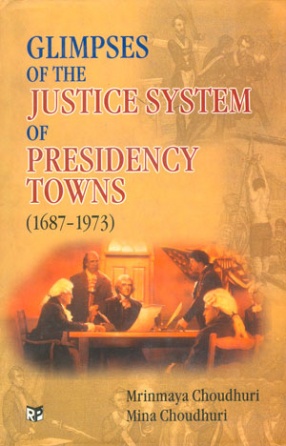
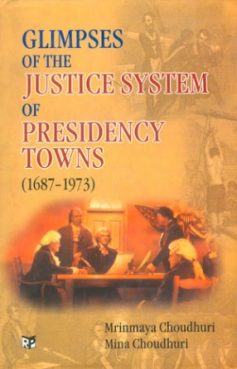
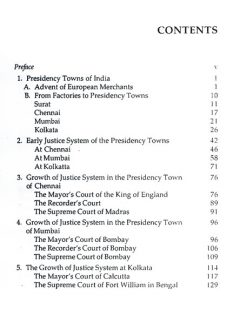
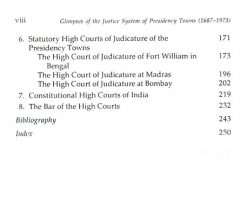
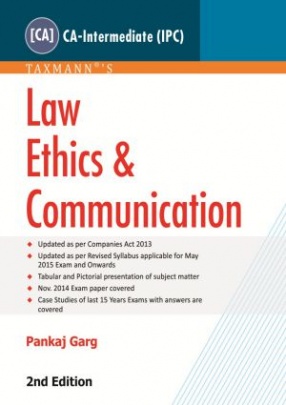
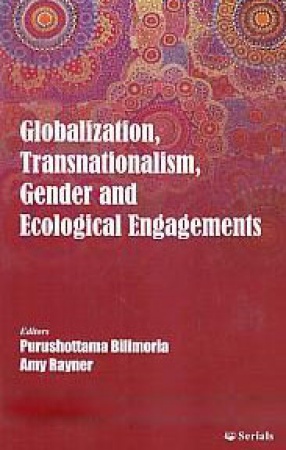
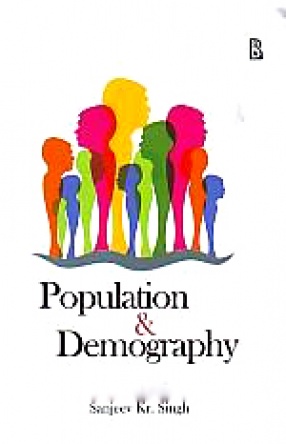
There are no reviews yet.